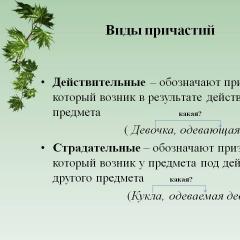Complex sentences with clauses: examples from the literature, table
In Russian, sentences are divided into simple and complex. Their difference lies in the fact that simple ones have one grammatical basis, in complex ones there can be two or more. In syntactic constructions, consisting of several parts, one of three types of communication can be used: compositional, non-union, or subordinate. Complex sentences with (grade 9) are the most extensive topic due to the number of meanings of the dependent part from the main one.
The concept of a complex sentence
A syntactic structure in which one part is dependent on another is called complex. It always has a main part (from which the question is raised) and a subordinate part. The sentences that are part of such a structure are combined or for example:
- The boy realized (what?) That his deception was revealed(the main part - the boy understood, to which the subordinate clause is attached with the help of the subordinate conjunction "what").
- Rather than being second in Rome, it is better to be first in the province(under what condition?) (the main proposal - it is better to be the first in the province - is connected with the dependent union "what").
- A wind blew from the north (what?) That made everyone button up their jackets(the main sentence - the wind blew from the north - is combined with the subordinate union word "which").
Depending on how the parts of a complex sentence are connected, they are divided into 4 types:
- with the help of unions to, what, how, whether (I could hear the gate creak);
- with attributive clauses, attached by union words which, which, whose, what, where other ( I bought the car I dreamed of for a long time);
- with a connecting clause using union words why, why, why and what (In the evenings, mom bathed her son, after which she always read him a fairy tale); We went up to the observation deck, from where the city was most visible).
The last type of syntactic constructions are divided into types according to their meaning.
Types of clauses
In complex sentences, the dependent part that answers the questions inherent in the circumstances is called that. Below are complex sentences with clauses. The table summarizes all their types:
time | as soon as the curtain went up, the orchestra began (when?) |
places | they came home, where a hot dinner and a warming grog were already waiting for them (where?) |
causes | the children laughed (for what reason?) because the dog got up on its hind legs and wagged its short tail |
conditions | if you find yourself nearby, please come to us (under what condition?) |
goals | I went to the store (for what purpose?) to buy bread for dinner |
concessions | he kept silent (despite what?), despite the fact that the resentment against his friend was strong |
comparisons | outside the window something rumbled (how what?), like a distant thunderstorm |
course of action | we did everything the way (how?), as indicated in the note |
measures and degrees | the girl was so shy (to what extent?) that she would never have spoken to a stranger first |
consequences | over the summer, Yegor grew up, so now he took second place in the ranks (in consequence of what?) |
Compound sentences with clauses are connected by unions and union words, depending on the meaning they define.
Subordinate clauses and degrees of action
This type of complex sentences in its dependent part gives an explanation of how the action was performed or indicates the degree of quality of the attribute of the object that is being discussed in the main one.
In such syntactic constructions, the following questions are posed to the subordinate clause: "how?", "How?", "How much?", "To what extent?" other. The dependent part is related to:

A complex sentence with a subordinate adverbial of the course of action is always constructed in such a way that the main part stands in front of the dependent one. If you swap them, then a different value is formed. For example:
- The snow was so bright (to what extent?) That the eyes began to water after a few minutes outside.
- The eyes started to water after a few minutes of being outside (for what reason?), Because the snow was so bright.
Subordinate tense
When the dependent part in indicates when the event took place, then this is a complex sentence with a contingent clause. In this case, the dependent part refers not to a separate concept, but to the entire main one, and gives answers to the questions "when?", "How long?", "Until when?", "Since when?"
They are connected with the help of temporary unions "when", "as soon as", "barely", "while", "as long as", "since" and others. In this case, the main sentence may contain words that have a meaning of time, for example, “then,” “after that,” “until then,” etc. For example, complex sentences with adverbial clauses from the literature:
- On the day (when exactly?) When I made this decision, in the Criterion bar, someone hit me on the shoulder (A. Conan Doyle).
- Now sit here for a while (how long?) While I run off to have a bite (J. Simenon).
In such syntactic constructions, complex unions can be used, which are separated by a comma into two parts. In this case, one of them is in the main sentence as an index word, and the second is in the subordinate clause in the form of a union ( It has already been 30 years since he left his hometown.).
In the event that the index word is absent, the dependent part can be either before or after the main one, but in two cases it is fixed:
- If complex sentences with subordinate clauses use conjunctions "how", "when suddenly", then they are after the main ( Lunch was already coming to an end, when suddenly another guest arrived).
- If double conjunctions are used, such as “when… then”, “only… how”, “when…. then". In this case, the subordinate clause is in front of the main part, and the second fragment of the double union can be omitted ( When the first snow falls, the flock will move south).

In other cases, the place of the subordinate clause can change without affecting the meaning of the sentence.
Subordinate clauses
A complex clause with a subordinate adverbial clause (examples below) can indicate a place of action or its direction. It answers the questions "where?", "Where?", "From where?" and refers to a specific word in the main part, which can be expressed by an adverb (there, there, from there, everywhere, everywhere and others).
- Everywhere (where exactly?), Wherever you looked, there was water.
- I come from there (where?), Where they never knew poverty.
The union words "where?", "Where?", "From where?" The dependent part in such syntactic constructions comes after the word being defined.
Clause clause
Complex sentences with subordinate clauses give an answer to the questions "under what condition?", "In which case?" Such syntactic constructions indicate the conditions under which the actions named in the main part are performed. In them, the dependent clause can refer both to the main part and to a separate predicate, and join using unions "if", "how" (in the definition of "if"), "if", "if" and "when" (in role "if").

A complex sentence with a subordinate adverbial clause (the examples below confirm this) conditions can be found both before the main one and after it:
- If you so want, be on this (on what condition?).
- You can get a chance to win the lottery (in which case?) If you buy tickets regularly.
- If you buy tickets regularly, you can win the lottery (the content of the offer has not changed from the rearrangement).
Often such syntactic constructions use unions consisting of two parts: “if… then”, “if…. so "," if .... then" ( If it rains tomorrow, then we will not go for mushrooms).
Clauses of purpose
Complex sentences with subordinate clauses indicate the purpose for which the action specified in its main part is performed. They provide answers to the questions "why?", "For what purpose?", "For what?"
Parts of such a syntactic construction are joined by the unions “so that”, “in order to”, “so that”, “if only”, “so that” and others, for example:

- To get there faster, he quickened his steps (for what purpose?).
- In order to be useful to people, you need to work hard on yourself (for what?).
- I said this in order (why?) To annoy my father.
Complex conjunctions can be separated, then there is a comma between them. One part remains in the main sentence, and the conjunction “to” is in the dependent.
Clause reasons
Complex sentences with subordinate adverbial reasons indicate the basis of what is said in the main part. The dependent sentence is fully related to the main one and answers the questions "for what reason?", "Why?", "Why?" and is joined by unions “because”, “good”, “since”, “because”, “because” and others, for example:

- Due to the fact that we rallied, the rivals could not defeat us (for what reason?).
- She was sad (why?), Because autumn brought rain and cold.
- We decided to take a break (why?), Because we walked for six hours in a row.
The clause in such syntactic constructions usually comes after the main clause.
Subordinate clause of the consequence
In complex sentences with similar subordinate clauses, the conclusion is indicated, which is made according to the content of the main part. It answers the question "what happened because of this?" The dependent fragment is joined to the main union "so" and always comes after it, for example:
- The heat intensified (what happened because of this?), So they had to look for cover.
- The girl started crying (what happened because of this?), So she had to give in to her request.
This type of construction should not be confused with subordinate clauses and measures in which the adverb "so" and the conjunction "what" ( Over the summer, he got so tanned that his hair looked white).
Clause of assignment
Complex sentences with these subordinate clauses provide explanations for events that occurred contrary to what was discussed in the main part.

They answer the questions "in spite of what?", "In spite of what?" and join the main part:
- unions "though", "though ... but", "despite the fact that", "let", "let" ( There were big puddles outside, although it rained yesterday);
- allied words with the particle "no" - "no matter how much", "no matter how much" "no matter what" ( No matter how much grandfather made a rocking chair, it came out lopsided).
Thus, subordinate assignments indicate why the action did not work.


